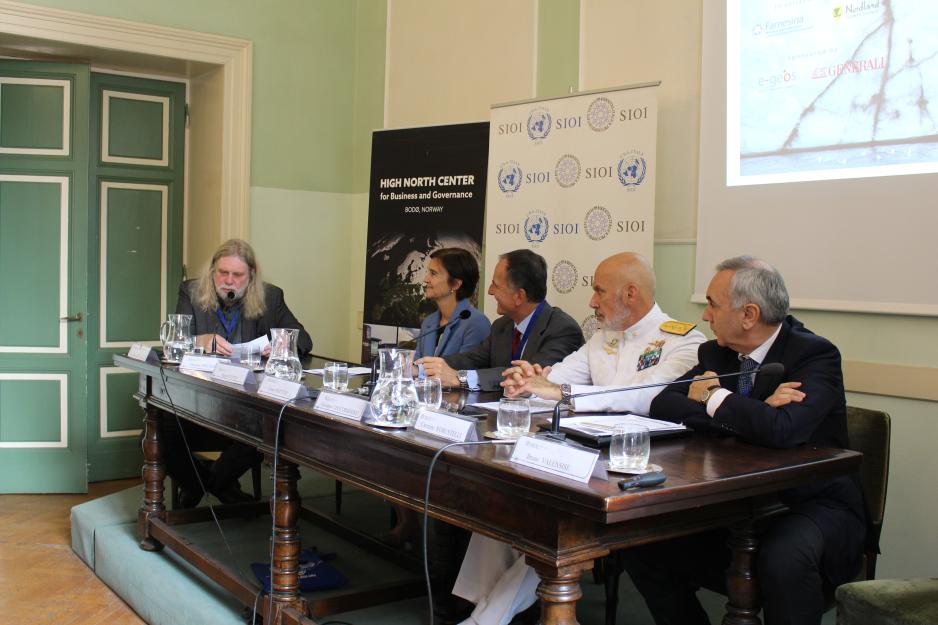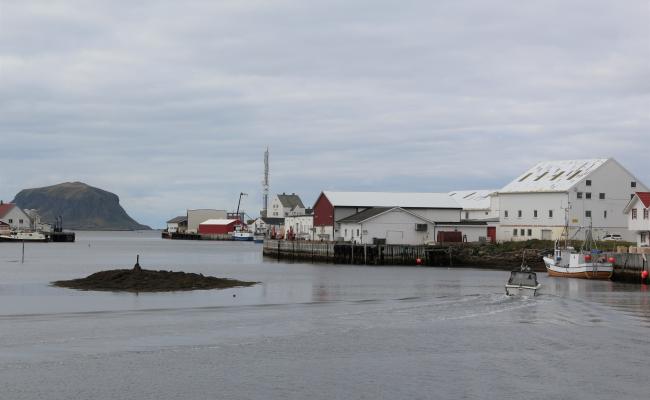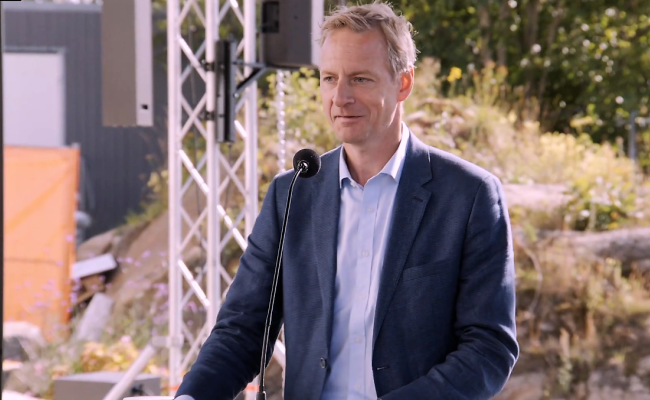Op-ed: Italy’s Growing Interest in the Arctic

Arctic Connections 2019 opening remarks in Rome by Editor-in-Chief at High North News, Arne O. Holm (right), accompanied by Margit Tveiten who served as Norways Ambassador to Rome, Franco Frattini who served as President of SIOI, Giuseppe Cavo Dragone - Chief of Defence for Italy, Carmine Robustelli - Special Envoy for the Arctic for Italy and Bruno Valensise, Deputy Director General of the Italian Department of Information Security. (Photo: Trine Jonassen)
The opinions expressed here belongs to the author and do not represent the views of High North News.
The Italian interest in the Arctic has been growing over time. The increasing accessibility of natural resources and transportation routes due to climate change has given impetus to the geopolitical significance of the Arctic over the last decades.
However, like several other countries, Italy showed its interest in the Arctic already more than one hundred years ago with the polar expeditions of Luigi Amedeo di Savoia in 1899. His objective was to reach one of the most northern lands in the world, the Land of Francesco Giuseppe, discovered by Austrian explorers sixteen years before.
Later, Umberto Nobile’s missions to the North Pole in 1926 and 1928 became famous worldwide. The second mission ended with a tragedy as some of the men of the airship crew lost their lives while Nobile was injured.
Since then, Italy’s engagement in the Arctic has enormously grown and is mainly based on scientific research.
Apart from some other expeditions, in 1990 Italy began its research activities in the Arctic through the involvement of the University of Rome in the work of the Thule High Arctic Atmospheric Observatory in Greenland and the opening of the Dirigibile Italia Arctic Station run by the Italian National Research Council (CNR) in the Svalbard Islands in 1997.
Italy also cooperates in international projects.
In addition to the CNR, also other research institutes – such as the Italian National Agency for New Technologies, Energy and Sustainable Economic Development (ENEA), the National Institute of Geophysics and Volcanology (INGV), and the National Institute of Oceanography and Experimental Geophysics (OGS) – have conducted research in the Arctic demonstrating a great interest of Italy in the region.
Additionally, in 2022 the Foreign Affairs Committee of the Italian Chamber of Deputies promoted the constitution of a Scientific Committee for the Arctic (CSA) and the creation of the Arctic Research Programme (ARP) in order to strengthen Italy’s scientific research activities in the Arctic.
Italy also cooperates in international projects and European Union (EU) Programmes.
Two examples are the Svalbard Integrated Arctic Earth Observing System (SIOS), which is ‘an international observing system for long-term measurements in and around the Norwegian archipelago of Svalbard addressing Earth System Science questions’, and International Network for Terrestrial Research and Monitoring in the Arctic (INTERACT), which is an infrastructure project seeking to build capacity for research and monitoring all over the Arctic.
Italy is also represented in the European Polar Board, an independent organisation including research institutes, logistics operators, funding agencies, scientific academies and government ministries from across Europe with the aim to deal with issues concerning infrastructure, international cooperation, policy advice and the environmental impacts of polar research and logistics.
Also read
In order to efficiently conduct scientific research in the Arctic, Italy maintains several polar research vessels like ‘OGS Explora’ that has conducted five oceanographic campaigns in the Arctic in addition to the eleven in Antarctica and the new research polar ship ‘Laura Bassi’, equipped with several laboratories and scientific instrumentation (its first campaign took place in August-September 2021).
Italy also bilaterally cooperates with several Arctic states on science and technology coordination (e.g. Canada) and environmental and socio-economic issues (e.g. Finland).
Italy is a member of the International Hydrographic Organization (IHO) and an Associate Member in the ARHC (Arctic Regional Hydrographic Commission) that work together with the International Arctic Science Committee (IASC), the Arctic Science Ministerial Meeting (ASM) and the Sustaining Arctic Observing Networks (SAON).
The scientific sector is not the only one in which Italy operate in the Arctic. Energy is indeed another important sector through which Italy has affirmed its presence in the region. In particular, Ente Nazionale Idrocarburi (ENI) operates in Alaska and in the Barents Sea.
In the Norwegian part of the Barents Sea ENI has established the Goliat off-shore platform, where it applies innovative operational standards and technology solutions utilizing innovative oil-spill prevention systems compliant with the harsh climate conditions and envisaging the active participation of the indigenous populations.
Furthermore, the Arctic is becoming the subject of university programmes.
ENI has also operated in the Russian part of the Barents Sea.
Another company, Enel Green Power, which deals with renewables and which is part of the Enel Energy company, Italy’s largest power utility (and the world’s second largest), participated in the Kolskaya wind project, which is located in the Russian region of Murmansk and is the largest wind farm currently under construction beyond the Arctic Circle.
Furthermore, the Arctic is becoming the subject of university programmes. For instance, the Ca’ Foscari University of Venice has recently launched a PhD course in Polar sciences while in 2016 the Italian Society for International Organizations (SIOI) established a Master's course on Sustainable development, resources geopolitics and Arctic studies.
These initiatives clearly demonstrate the Italy is trying to deepen and widen its knowledge of the region in order to get more involved in the Arctic affairs.
Additionally, Italy was one of the original signatories of the 1920 Spitsbergen Treaty and since 2013 is an observer of the Arctic Council (AC), the most important intergovernmental forum guiding cooperation in the region. Therefore, Italy takes part in the work of the AC’s Working Groups.
Italy considers the AC as the cornerstone of cooperation in the Arctic and is very determined to continue contributing to its activities on the basis of the following values: the respect for the international law and for the Arctic States' sovereignty; the support of bilateral and multilateral cooperation; the promotion of local and Indigenous cultures and traditions; the protection of the environment and the promotion of sustainable development of the Arctic.
In conclusion, Italy is an active actor in the Arctic with interests especially in the scientific and energy sectors. Its knowledge of and experience in the region are growing over time through the engagement in the AC’s activities as well as through the involvement in scientific research and the establishment of university programmes.




